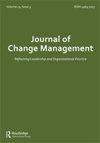变革领导者的心态:探索领导力发展的启动方法
IF 3
Q2 MANAGEMENT
引用次数: 0
摘要
诊断型和对话型组织发展提出了两种截然不同的变革实践,它们经常被串联讨论。然而,越来越多的证据表明,它们在实践中是共同应用的。对于那些参与领导这些实践的人来说,共同应用意味着改变他们的参与方式,比如从诊断分析开始确定变革的目标,然后转向对话过程,以促进新的工作方式的出现。然而,对这两种实践的理论描述仍然存在分歧,因此,忽视了帮助领导者在敬业风格之间转换的领导力发展方法。为了解决这个问题,本文探讨了一种专注于思维方式的领导力发展方法。我们提出了与诊断和对话实践的领导相关的心理学设置的六种心态。这项工作的一个关键贡献是对领导力发展的新视角。扩展心理学衍生的关于如何激活心态的知识,为变革实践的领导者提供了一种方法,可以提高他们对心态的认识,并控制他们的心态,帮助他们根据变革环境的要求调整自己的参与度。本文旨在通过提供一种实用的方法来发展变革领导者,从而实现改变。很多时候,变革实践文献研究成功的领导者,目的是确定他们做了什么,而同时忽视了发展这些相同行动和行为的机制。本文通过关注心态来解决这种疏忽。它为领导者提供了一种方法,让他们提高对自己激活的心态的认识,并控制自己的心态,从而使他们的行动与改变领导环境相一致。本文章由计算机程序翻译,如有差异,请以英文原文为准。
Mindsets for Change Leaders: Exploring Priming Approaches for Leadership Development
ABSTRACT Diagnostic and dialogic organization development present two contrasting change practices that are frequently discussed in tandem. Yet, an increasing body of evidence shows they are co-applied in practice. For those involved in leadership of these practices, co-application means switching their engagement, such as commencing with a diagnostic analysis to determine the goals of change, then switching to dialogic processes to foster the emergence of new ways of working. However, theoretical descriptions of these two practices remain bifurcated and, as such, overlook leadership development approaches that help leaders switch between engagement styles. Addressing this problem, this paper explores a leadership development approach that focusses on mindsets. We propose six mindsets from psychology settings that are relevant for leadership of diagnostic and dialogic practices. A key contribution of this work is a new perspective on leadership development. Extending psychology-derived knowledge on how to activate mindsets provides leaders of change practices with a means to increase awareness of, and take control of, their mindset, helping them to adjust their engagement as change contexts dictate. MAD statement This paper seeks to Make a Difference (MAD) by offering a practical means to develop change leaders. Far too often, change practice literature has studied successful leaders with the aim to identify what they do, while at the same time overlooking the mechanics that develop these same actions and behaviours. The paper addresses this oversight with a focus on mindsets. It puts forward a means for leaders to increase awareness of, and take control of, their activated mindset and, in doing so, align what they do to change leadership contexts.
求助全文
通过发布文献求助,成功后即可免费获取论文全文。
去求助
来源期刊

JOURNAL OF CHANGE MANAGEMENT
MANAGEMENT-
CiteScore
6.60
自引率
20.00%
发文量
14
期刊介绍:
Journal of Change Management is a multidisciplinary and international forum for critical, mainstream and alternative contributions - focusing as much on psychology, ethics, culture and behaviour as on structure and process. JCM is a platform for open and challenging dialogue and a thorough critique of established as well as alternative practices. JCM is aiming to provide all authors with a first decision within six weeks of submission.
 求助内容:
求助内容: 应助结果提醒方式:
应助结果提醒方式:


